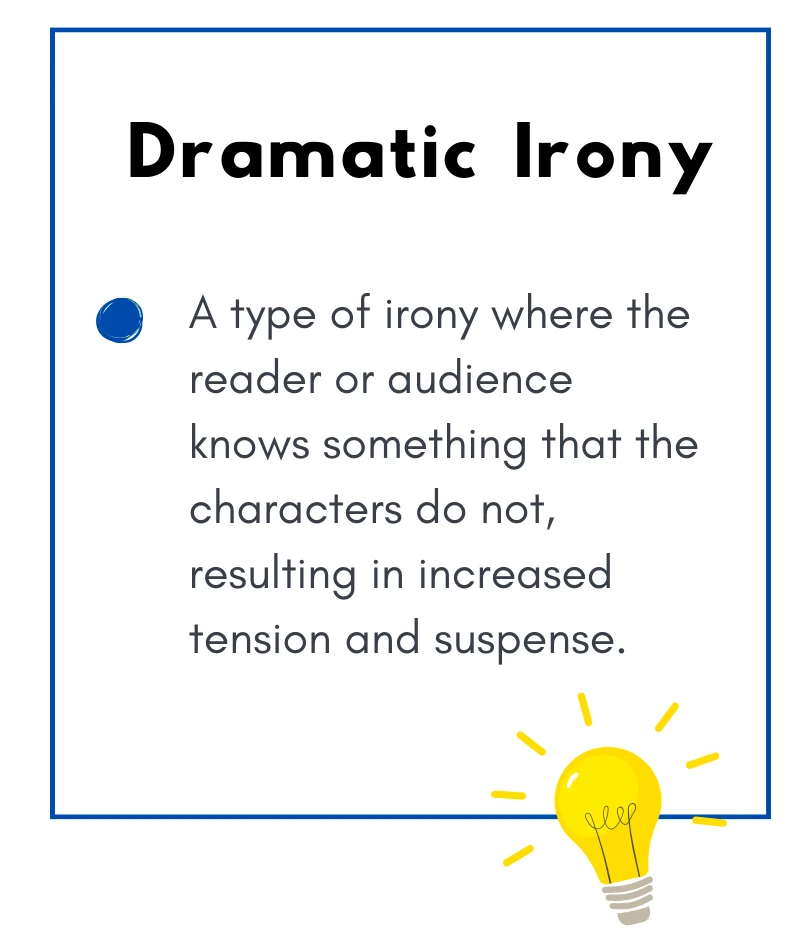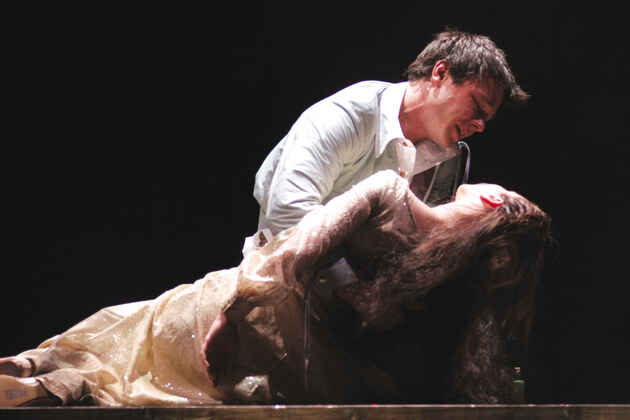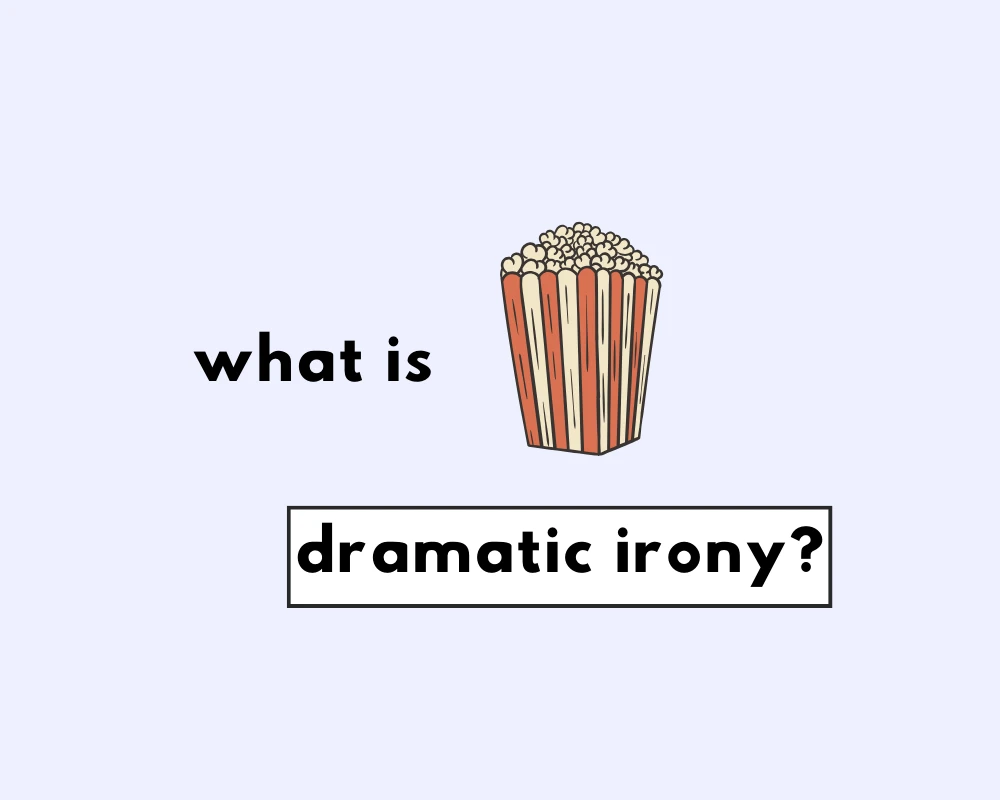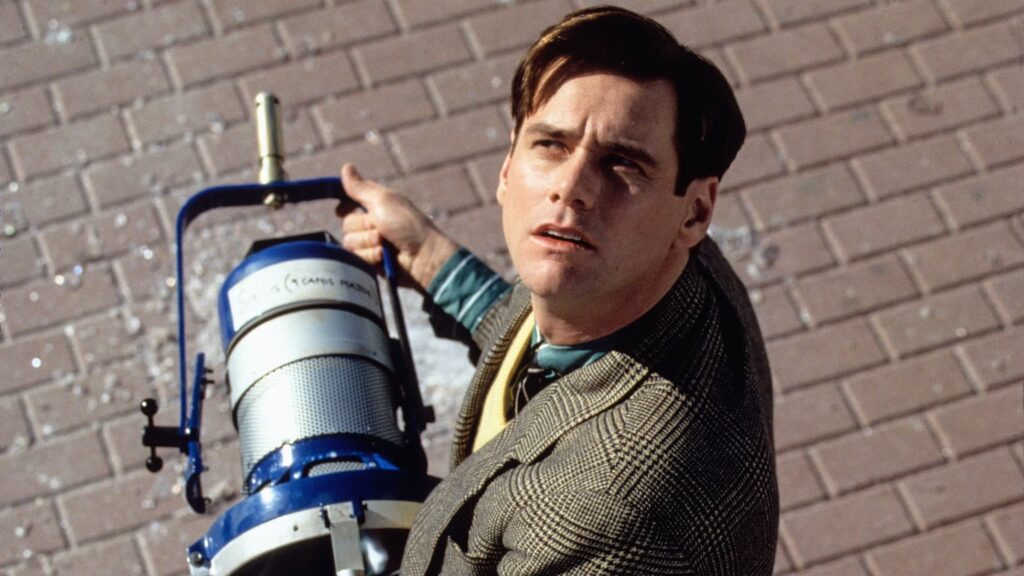Contents
Toggle
What is “dramatic irony”?
In almost every generic, (recycled dribble) scary movie you can think of, you have your classic killer that’s about to pounce, but the characters in the story are left in the dark, both literally and figuratively.
The feeling of suspense—when you’re on the edge of your seat in anticipation of what’s about to happen—this is a result of the literary technique known as dramatic irony.
Wanting to break through the TV screen (or the page of a book) to let a character in on something that’s about to happen; this is precisely what dramatic irony aims to evoke in its audience. There are different types of irony, but dramatic irony describes when the audience knows more information about the story than the characters themselves do.

Writers use dramatic irony to bring complexity to the story, and to hook the audience so that they are invested and want to know the outcome of the story events. Used effectively, dramatic irony can have a profound impact on the audience’s engagement in a story, and can interweave layers of suspense and tension that few other literary techniques are able to accomplish in much the same way.
At its core, dramatic irony is when the audience is knowledgeable or aware of certain things that are unknown to some or all of the characters within the story. This gap between what the characters understand compared to the audience creates sense of tension, anticipation, or feelings of inevitable dread. Unlike other forms of irony, such as verbal or situational irony, dramatic irony relies on the audience’s awareness of a narrative relative to that of the character’s within the story.
The difference between dramatic and verbal or situational irony
Verbal irony occurs when the literal words of what someone says differs sharply from their intended meaning. Common figures of speech like sarcasm, understatement or overstatement are all types of verbal irony. An example would be to say “the weather today is fantastic!“, when it’s actually gloomy and rainy outside. The true meaning is the complete opposite of what the literal words themselves say.
Situational irony can be similar to dramatic irony, but some key differences is that with situational irony, the reader learns of the events unfolding along with the characters themselves. With dramatic irony, the audience knows about key elements of the plot which the characters themselves do not.
Examples of dramatic irony in literature & media

1. Romeo and Juliet
Can you mention ‘dramatic irony’ without also crediting its most famous example in English literature? The plot of Romeo and Juliet by William Shakespeare shows dramatic irony in a tragic form in its iconic final act.
The audience knows that Juliet is not truly dead, but only appears dead from the elixir she drank. Romeo, believing that she is actually dead, acts on this information and kills himself too. As the audience, we know that the deaths would be preventable had Romeo been aware of the facts of the situation. However, it’s because of our awareness of this critical information that holds our attention to seeing how the rest of the story unfolds.
2. The Truman Show
The Truman Show might be one of the greatest movies of all time, and the story depends on the use of dramatic irony. Truman’s entire life has been a television broadcast on air for the public to watch. The only thing is that he doesn’t know this. The audience, on the other hand, is aware of his lack of information, creating a sense of suspense and anticipation as Truman begins to question the reality around him.
Because we know Truman’s reality is phony, and because we also know that Truman himself doesn’t know this about his own life, we are all the more invested to learn what happens as the plot thickens and unfolds.
3. Oedipus Rex
Oedipus Rex is an Athenian tragic play by Sophocles, and it is riddled with examples of dramatic irony. There are several instances throughout the play where the audience knows more than the characters themselves. Oedipus makes an oath to set out to find Laios’ killer; while, unbeknownst to Oedipus himself, he is the killer that he sets out to find. Had he known that he was indeed the one who killed Laios, he probably wouldn’t have pledged to find the person that killed him.
4. Dexter
The entire plot of the TV series Dexter relies heavily on the concept of dramatic irony to work. The lead character, Dexter, is a forensic analyst that specializes in blood-spatter analysis. On his spare time, he is also a sociopathic serial killer that targets other criminals/serial killers. Dexter uses his employment in the forensics unit as a way to cover for his illicit activities on his off-time, but of course none of his co-workers are aware of his “other” side.
This double-life that Dexter leads, which the audience is aware of, but none of the other characters know about creates intense suspense and anticipation while watching the series unfold. It’s a straightforward example of how dramatic irony sustains and builds tension or suspense throughout a narrative.
5. Frozen
Disney’s film Frozen clearly shows dramatic irony within its central narrative. The protagonist and titular character, Queen Elsa, turns everything she touches into ice, making her a threat to the safety of those around her against her will. Because of her icy powers, she hides away in her room, leaving her sister Anna alone and left to her own devices.
As the audience, we’re aware of Elsa’s condition, but we’re also aware that those near and dear to Elsa, i.e., her sister Anna, are not. This technique—where there is a gap in awareness between the characters within the story and those watching in from the outside, i.e., dramatic irony) breeds a specific tension that heightens audience engagement and, as its name suggests, is highly dramatic.
6. Most scary movies
Scenario: A girl gets into the front seat of her car, not knowing that the killer is hiding in the back. We (as the audience) know what’s about to happen, but she does not.
It’s the kind of things that makes you want to cover your eyes and not look, but you secretly have to look, because of the sheer suspense of it all.
7. Finding Nemo
In Finding Nemo, there’s a scene where Nemo’s dad is critiquing the school teacher’s capabilities in looking after his kid, and while he’s speaking with him and is not paying attention, Nemo swims away.
8. Beauty and the Beast
In the iconic Disney animated tale, The Beauty and the Beast, the central narrative relies on dramatic irony: Belle is unaware that “the Beast” is really a handsome prince put under a witch’s spell. We, as the audience, are aware of the true circumstances of the situation.
9. Legally Blonde
Another classic film, Legally Blonde, is rife with examples of dramatic irony throughout. Early on, Elle thinks she’s being proposed to by her college boyfriend (Warner Huntington III), only to realize that she’s actually getting dumped.
10. Forrest Gump
Forrest Gump is perhaps the simplest man to live the most extraordinary of lives; though the only one that may not see it that way is Forrest himself. Despite being a fictional character, Forrest’s approach to life with purely good intentions, and like a “feather in the wind”, led him to accomplish a great number of impressive things.
At the beginning of the film, Forrest’s mother (played wonderfully by Sally Fields) is told by a school authority that her son is mentally slow, and not to expect much from him. This movie shows what it means to break boundaries and labels, and that mental aptitude is perhaps not always the most important consideration.
Components of dramatic irony
- Audience Knowledge: At the heart of dramatic irony is the audience’s possession of information that the characters lack. This awareness can take various forms, from knowledge about a character’s true intentions to insights into the unfolding plot twists.
- Character Ignorance: The characters involved are unwitting participants in the dramatic irony. Their lack of awareness regarding key information sets the stage for the tension to unfold. Often, what guides their actions is an incomplete or inaccurate understanding, leading to consequences that the audience can foresee.
- Narrative Tension: The inherent tension arising from the audience’s privileged knowledge creates a captivating atmosphere. Viewers or readers become invested in the unfolding drama, eagerly anticipating the moment when the characters’ ignorance clashes with the revealed truth.











